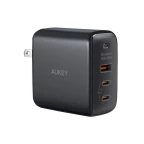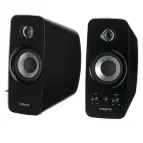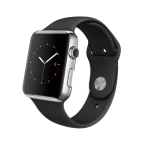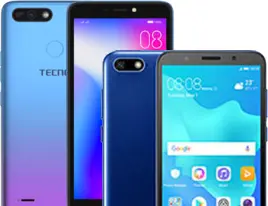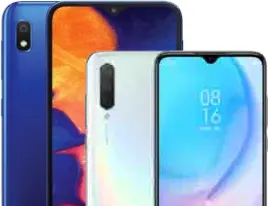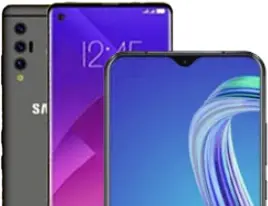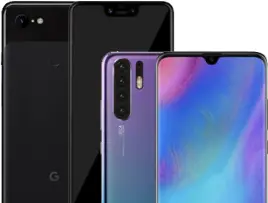

Samsung Galaxy S9
Specifications
- 5.8 inchesDisplay
- 4 GB RAMRAM
- 300011.55 mAhBattery
- 12 MPBack Camera
| General Features | |
|---|---|
| Release Date | 01 Feb 2018 |
| SIM Support | Single SIM (Nano-SIM) or Hybrid Dual SIM (Nano-SIM, dual stand-by) |
| Phone Dimensions | 5.81 x 2.70 x 0.33 in |
| Phone Weight | 163 g |
| Operating System | Android 8.0 (Oreo) |
| Display | |
|---|---|
| Screen Size | 5.8 inches |
| Screen Resolution | 1440 x 2960 pixels |
| Screen Type | Super AMOLED capacitive touchscreen, 16M colors |
| Screen Protection | Corning Gorilla Glass 5 |
| Memory | |
|---|---|
| Internal Memory | 64/128/256 GB |
| RAM | 4 GB RAM |
| Card Slot | microSD, up to 512 GB (uses SIM 2 slot) - dual SIM model only |
| Performance | |
|---|---|
| Processor | Octa-core (4x2.7 GHz Mongoose M3 & 4x1.8 GHz Cortex-A55) - EMEAOcta-core (4x2.8 GHz Kryo 385 Gold & 4x1.7 GHz Kryo 385 Silver) - USA/LATAM, China |
| GPU | Mali-G72 MP18 - EMEAAdreno 630 - USA/LATAM, China |
| Battery | |
|---|---|
| Type | Non-removable Li-Ion 3000 mAh battery (11.55 Wh) |
| Camera | |
|---|---|
| Front Camera | 8 MP |
| Front Flash Light | No |
| Front Video Recording | 1440p@30fps |
| Back Flash Light | Yes |
| Back Camera | 12 MP |
| Back Video Recording | 2160p@60fps, 1080p@240fps, 720p@960fps, HDR, dual-video rec. |
| Connectivity | |
|---|---|
| Bluetooth | Yes |
| 3G | Yes |
| 4G/LTE | Yes |
| Radio | FM radio (USA & Canada only) |
| WiFi | Yes |
| NFC | Yes |
Highlights
Gather around everyone, its flagship time. February to March is that time of the year when the whole world awaits in anticipation of first of Samsung’s flagship releases. This is the time when Samsung’s Galaxy S series finds out its latest and greatest flag-bearer while August is the time when the Note series finds out its successor to the throne.
At this moment in time, we here at PriceOye are more concerned with what the Galaxy S series is up to. While the Galaxy S8 and S8+ arguably proved to be the most exciting phones of 2017, it was extremely hard to see how the South Korean giants would improve upon them. They were nearly bezel-less, housed superb hardware that catered well for the demands of the built-in Android Nougat and as always, contained amazing cameras.
The Galaxy S9 is built on similar laurels. By that, we mean that the smartphone performs excellently in all aspects but is missing one key element compared to the Galaxy S8; something new. The differences between the Galaxy S8 and S9 can be compared to the minor differences between the iPhone 7 and the iPhone 8; improved hardware, near-similar build and everything else is virtually the same. That’s kind of disappointing for everyone as we always expect the top dogs to bring something new out of their hat and Samsung has kind of failed to do that this time. However, we’re not in any way degrading the capabilities of the Galaxy S9 in any fashion. It just lacks something new.
Similar premium build but more curvier than before
We’ll begin describing the Galaxy S9 starting with its build quality and design; the smartphone almost completely inherits its looks, build materials and premium-ness from its predecessor, the Galaxy S8, with almost nothing to choose between the two devices. The only difference between the two is the primary camera setup at its back panel; the S8 had a sideways panel while the S9 houses a vertical one. That’s the only way to tell the difference between the two.
Another notable difference between the two Galaxies is the Galaxy S9 featuring a curved back glass panel unlike the Galaxy S8. It’s exactly like what you’ve seen on Note devices like the Note 5 and Note FE adding further premium-ness to an already premium smartphone. Dimensions wise, the S9 is a tad obese compared to its predecessor with an 8.5mm width while also weighing slightly more at 165g without any apparent reason.
Other than that, we’re witnessing IP68 certified dust and waterproofing while both the front and back panel see Corning Gorilla Glass 5 protection; exactly what the Galaxy S8 offered.
Cameras and display: gorgeously poised but then again, you’ve seen this before
When we said that the only problem we’ve found with the Galaxy S9 is the fact that it doesn’t offers much compared to its predecessors, we were pushed to say this due to the fact that two of its major departments are completely similar to what the Galaxy S8 had to offer; the display and the cameras department.
First off, we’ll focus on the display department; as gorgeous as it gets, the Galaxy S9 promising a display of the highest order was a foregone conclusion. The smartphone features an 18.5:9 aspect ratio display, like the Galaxy S8, that almost stretches from the very top of the front panel to the very bottom. That means you won’t be getting any major redesigning with the S9 which should’ve been an easy thing to understand by now.
Speaking in numbers, the display is a large 5.8 inches Super AMOLED capacitive touchscreen with 570ppi pixel density to what Samsung refers to as Infinity display. Unsurprisingly that allows the display to muster-up a 1440p HD resolution that looks absolutely stunning and gorgeous. That has also been made possible by the Corning Gorilla Glass 5 coating atop it. Experience wise, you’ll be on the ride of your life with the S9’s display as it produces top-drawer results that are probably the best in the world.
Time to delve into the cameras department; while AGAIN promising nothing new, the S9 ensures that it doesn’t compromises on quality by producing a 12 MP primary sensor with superb camera features that includes dual-pixel PDAF, OIS and an LED flash amid numerous other customary features. The selfie sensor stands at a respectable amount on 8 MP which ensures that the cameras department, although surprisingly not featuring dual primary sensor which has become a norm in flagships nowadays, fulfills your plate with lots of proven quality.
Same hardware but more variants
The hardware department brings subtle differences between the Galaxy S9 and the Galaxy S8. Some of the improvements made by the S9 are not even significant to the common man as we’ve witnessed things like improvement in its GPU etc.
What really matters to the public is the smartphone featuring a powerful hybrid octa-core processor with variant dependent internal storage. RAM stands at a constant for all the variants which size-up at 64, 128 or 256GB. That’s a decent upgrade but then again, we’re sure it won’t be appeasing most of you out there. Anyhow, uncompromising performance yet again comes to the furor with the S9 carrying-on the good-work done by the Galaxy S8.
Other excellent features the newly wed flagship inherits from its predecessor include a responsive, rear-mounted fingerprint scanner that no longer resides at the side of the primary sensor. It now resides underneath it which is a much better location in our opinion. Other noteworthy features to talk about are USB type-C, Quick Charge 2.0, region dependent Qi wireless charging, Bixby virtual assistant like Apple’s Siri and the now customary Samsung feature known as the Iris Scanner that gives you even more secure unlocking and other options.
The smartphone’s battery remains at 3000 mAh while the external memory card-slot can now accommodate memory up to 400 gigs compared to the 256 gigs offered by the Galaxy S9. For now, the colour schemes of the S9 include black, blue, grey and purple but we’re sure that you’re going to see newer additions to them sooner rather than later. That’s all for the Galaxy S9 folks!
Galaxy S9 pros:
- Proven display, lag-free performance, premium build quality, uncompromising cameras and loads of excellent hardware related features are what the Galaxy S9 is all about
Galaxy S9 cons:
- We’ve mentioned this countless times before in this article but we’ll reiterate again; the S9 doesn’t really offers something new compared to its predecessor
- We don’t really find the need to spend some extra thousand bucks on a smartphone that nearly offers no upgrade upon the already proven Galaxy S8





